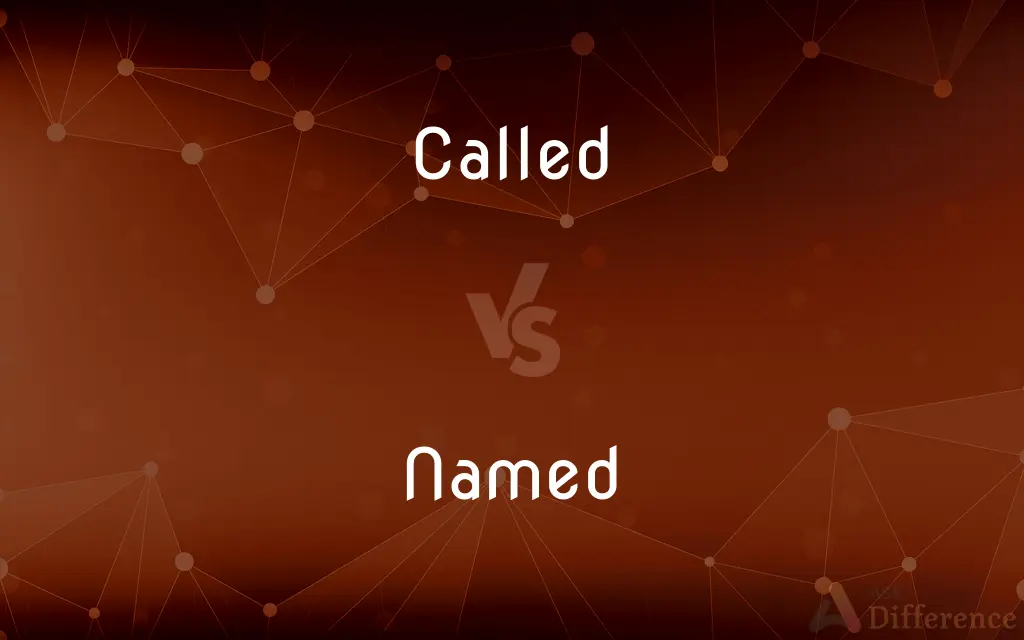Called vs. Named — What's the Difference?
Edited by Tayyaba Rehman — By Maham Liaqat — Updated on March 7, 2024
"Called" often implies usage or function, while "named" denotes a formal designation or title.

Difference Between Called and Named
Table of Contents
ADVERTISEMENT
Key Differences
"Called" is frequently used to describe the function or common reference for something, emphasizing its role or characteristic feature. For example, a device called a "smartphone" integrates phone capabilities with computer-like functions, whereas a device named "iPhone" is a specific brand and model within the smartphone category, highlighting the distinction between general function and specific identity.
In social contexts, a person might be called by a nickname that reflects their personality or a notable trait, while their given name is a formal identity assigned at birth or through legal means. This difference illustrates how "called" can denote informal or functional labels, whereas "named" relates to formal or official designations.
Geographical locations often have colloquial names they are called by locals, which might differ from their official names on maps and documents. For instance, a city called "The Big Apple" refers informally to New York City, whereas "New York City" is its official name, demonstrating how "called" and "named" can coexist with differing connotations.
In literature and media, characters might be called by titles or roles that signify their part in the story, such as "the hero" or "the antagonist," while their names provide specific identity and background, underscoring the narrative function versus personal identity.
In the realm of branding and marketing, products or services are often called by a descriptor that highlights their purpose or benefit, while their brand name establishes a unique market identity, illustrating the functional versus proprietary aspects of naming.
ADVERTISEMENT
Comparison Chart
Definition
Often used to describe function or common reference.
Denotes a formal designation or title.
Context
Emphasizes role, characteristic, or colloquial use.
Relates to formal identity, legal, or official designation.
In Social Contexts
Refers to nicknames or informal labels.
Pertains to given names or legally assigned titles.
Geographical Locations
Colloquial or informal references.
Official names as per maps and legal documents.
In Literature and Media
Titles or roles signifying story parts.
Specific identity and background of characters.
Compare with Definitions
Called
Referred to by a specific name or title.
The device is commonly called a laptop.
Named
Given a specific designation or title.
The building was named after the city's founder.
Called
Known or labeled as.
She's called the fastest runner in the school.
Named
Known officially or formally as.
The official flower of the state is named the Bluebonnet.
Called
Identified by a characteristic or function.
This tool is called a wrench due to its function.
Named
Entitled or christened with a name.
The new product line was named EcoGreen.
Called
Addressed or summoned by a name.
He was called into the office by his boss.
Named
Assigned a particular name or identity.
Their first child was named Emma.
Called
Called can imply informal naming based on usage or function.
The area is called Downtown by the locals.
Named
Named implies a formal or official designation.
The scholarship was named in honor of the donor.
Called
To say in a loud voice; announce
Called my name from across the street.
Calling out numbers.
Named
A word or words by which an entity is designated and distinguished from others.
Called
To demand or ask for the presence of
Called the children to dinner.
Call the police.
Named
A word or group of words used to describe or evaluate, often disparagingly
Don't call me names.
Called
To demand or ask for a meeting of; convene or convoke
Call the legislature into session.
Named
Representation or repute, as opposed to reality
A democracy in name, a police state in fact.
Called
To order or request to undertake a particular activity or work; summon
She was called for jury duty. He was called to the priesthood.
Named
A reputation
Has a bad name.
Called
To give the command for; order
Call a work stoppage.
Named
A distinguished reputation
Made a name for himself as a drummer.
Called
To communicate or try to communicate with by telephone
Called me at nine.
Named
An illustrious or outstanding person
Joined several famous names for a photograph.
Called
To dial (a telephone number)
Call 911 for help.
Named
To give a name to
Named the child after both grandparents.
Called
To lure (prey) by imitating the characteristic cry of an animal
Call ducks.
Named
To mention, specify, or cite by name
Named the primary colors.
Called
To cause to come to the mind or to attention
A story that calls to mind an incident in my youth.
Named
To call by an epithet
Named them all cowards.
Called
To name
What will you call the baby?.
Named
To nominate for or appoint to a duty, office, or honor.
Called
To consider or regard as being of a particular type or kind; characterize
Let's call the game a draw. I'd hardly call him a good manager.
Named
To specify or fix
We need to name the time for our meeting.
Called
To designate; label
Nobody calls me a liar.
Named
Well-known by a name
A name performer.
Called
To demand payment of
Call a loan.
Named
Having a name.
Called
To require the presentation of (a bond) for redemption before maturity.
Named
Simple past tense and past participle of name
Called
To force the sale of (a stock or commodity) by exercising a call option.
Named
Given or having a specified name; as, an actor named Harold Lloyd; a building in Cardiff named the Temple of Peace. Contrasted to unnamed.
Called
To stop or postpone (a game) because of bad weather, darkness, or other adverse conditions.
Named
Bearing the author's name; as, a named source. Opposite of anonymous.
Called
To declare in the capacity of an umpire or referee
Call a runner out.
Call a penalty for holding.
Named
Given or having a specified name;
They called his name Jesus
Forces...which Empedocles called `love' and `hate'
An actor named Harold Lloyd
A building in Cardiff named the Temple of Peace
Called
To indicate a decision in regard to
Calling balls and strikes.
Called a close play at home plate.
Named
Bearing the author's name;
A named source
Called
To give the orders or signals for
A quarterback who called a poor play.
Called
To describe the intended outcome of (one's billiard shot) before playing.
Called
In poker, to place a bet equal to (the preceding bet or bettor).
Called
To indicate or characterize accurately in advance; predict
It is often difficult to call the outcome of an election.
Called
To challenge the truthfulness or genuineness of
Called the debater on a question of fact.
Called
To shout directions in rhythm for (a square dance).
Called
To speak loudly; shout
A swimmer who was calling for help.
Called
To utter a characteristic cry. Used of an animal
Geese calling in the early morning.
Called
To communicate or try to communicate with someone by telephone
I called twice, but no one answered.
Called
To pay a short visit
We called to pay our respects. He called on the neighbors but they weren't home.
Called
(Games) In poker, to place a bet equal to the preceding bet.
Called
A loud cry; a shout.
Called
The characteristic cry of an animal.
Called
A sound or an instrument made to imitate such a cry, used as a lure
A moose call.
Called
A telephone communication or connection.
Called
Need or occasion
There was no call for an apology.
Called
Demand
There isn't much call for buggy whips today.
Called
A claim on a person's time or life
The call of duty.
Called
A short visit, especially one made as a formality or for business or professional purposes.
Called
A summons or invitation.
Called
A signal, such as that made by a horn or bell.
Called
The sounding of a horn to encourage hounds during a hunt.
Called
A strong inner urge or prompting; a vocation
A call to the priesthood.
Called
The strong attraction or appeal of a given activity or environment
The call of the wild.
Answered the call of the desert.
Called
A roll call.
Called
A notice of rehearsal times posted in a theater.
Called
A decision made by an umpire or referee.
Called
An announced description of a game or race, as by a sportscaster.
Called
A direction or series of directions rhythmically called out to square dancers.
Called
A demand for payment of a debt.
Called
A demand to submit bonds to the issuer for redemption before the maturity date.
Called
An option to buy a certain quantity of a stock or commodity for a specified price within a specified time.
Called
A demand for payment due on stock bought on margin when the value has shrunk.
Called
Simple past tense and past participle of call
Called
Having the name of.
Called
Given or having a specified name;
They called his name Jesus
Forces...which Empedocles called `love' and `hate'
An actor named Harold Lloyd
A building in Cardiff named the Temple of Peace
Called
Known or spoken of as;
Though she is named Katherine, she is called Kitty
Common Curiosities
How does "called" differ from "named" in everyday language?
In everyday language, "called" might refer to informal, functional, or colloquial labels, while "named" tends to imply more formal or official designations.
Do "called" and "named" have the same importance in identity?
The importance varies by context; "called" can be significant in reflecting function or personal traits, while "named" carries weight in legal and formal identity.
How do "called" and "named" function in branding?
In branding, a product might be called by a descriptor highlighting its use or benefit, while its brand name (named) establishes a unique identity.
How is "named" defined?
"Named" denotes a formal or official designation, title, or identity given to someone or something.
Can something be both called and named the same thing?
Yes, an entity can be both called and named the same thing, especially if its common name aligns with its formal or official designation.
How do "called" and "named" impact personal identity?
A nickname (called) can influence one's perceived identity or traits, whereas a given name (named) holds legal and formal significance.
Is "called" always less formal than "named"?
Typically, "called" is less formal and can refer to nicknames or titles based on characteristics, whereas "named" is more formal and official.
How do "called" and "named" relate to history and tradition?
Historically, "named" might reflect heritage or lineage, while "called" can be tied to cultural or colloquial developments.
What does "called" mean?
"Called" often refers to the name or title used in common reference or to describe function, not necessarily the official or formal name.
Can animals be both called and named?
Yes, animals can have species names they are called by and individual names they are named, reflecting both general classification and personal identity.
Are "called" and "named" interchangeable in legal contexts?
In legal contexts, "named" is typically preferred for its formal and specific implications, while "called" might be used more informally or descriptively.
Can geographical locations have both a called and named identity?
Yes, geographical locations often have both informal names they are called by locals and official names recognized in legal documents.
Is there a legal difference between "called" and "named"?
Legally, "named" holds more weight as it pertains to official documentation and formal designations, whereas "called" might not have legal standing.
How do "called" and "named" affect perception?
What something is called can affect immediate perception and recognition, while what it is named might convey deeper identity or significance.
Can "called" and "named" change over time?
Yes, what something is called can evolve with language and culture, while what it is named might change less frequently, often requiring formal procedures.
Share Your Discovery

Previous Comparison
Application vs. Operation
Next Comparison
Pepsin vs. ReninAuthor Spotlight
Written by
Maham LiaqatEdited by
Tayyaba RehmanTayyaba Rehman is a distinguished writer, currently serving as a primary contributor to askdifference.com. As a researcher in semantics and etymology, Tayyaba's passion for the complexity of languages and their distinctions has found a perfect home on the platform. Tayyaba delves into the intricacies of language, distinguishing between commonly confused words and phrases, thereby providing clarity for readers worldwide.
















































